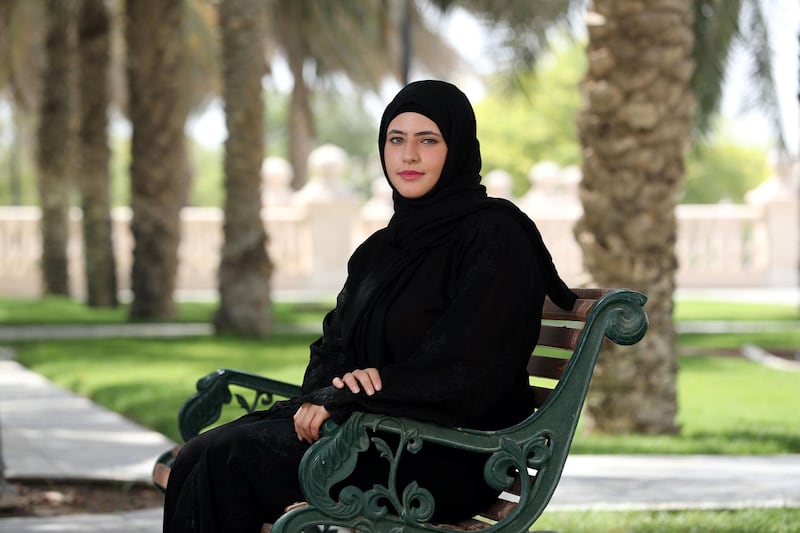The aroma of freshly-baked Eid cookies in the living room, the loud chanting of Takbir Prayers in the house and lively conversations exchanged over feasts tell the story of Eid Al Fitr spent amongst family members.
However, for expatriates celebrating in the UAE away from family members and loved ones, Eid is spent with the communities they’ve built away from home.
Isra Keshk, a third-year business management student at the American University of Sharjah, is spending her first Eid away from her home in Cairo.
“I plan to spend this Eid around a bonfire with my friends sharing laughs and deep talks, making smores and playing aroosty (charades) and other games together,” said Ms Keshk, 19. “We will be going camping in Al Ain or Hatta to enjoy nature.”
With flickering fairy lights intertwined around her bed frame, a rainbow garland fluffed around her dorm room ceiling and musk perfume sprayed in the air, Ms Keshk recreates her family Eid traditions with her friends to feel closer to home.
“My friends and I buy Eid kaak from the store and then arrange them in cute designs on a platter to remind me of the kaak I used to bake with my mom back home,” said Ms Keshk. “We also light candles and spray musk perfume around the room to remind us of the bakhour scent that fills the house on Eid morning back home.”
Piled coursework on the right of her desk and midterms that are due after her six-day holiday prevent Ms Keshk from enjoying Eid with her family.
“My twin brothers sent me a voicenote yesterday on WhatsApp telling me please come for a day or two, play with us on Eid and then leave,” said Ms Keshk. “It pains me that I can’t be there with them but I will be too exhausted to study after Eid if I were to fly there.”
Ayaz Ramadan, 24, shares the same reminder of loneliness that Eid holds for him this year.
“You’re missing everything,” said Ayaz Ramadan. “You can’t hug them through the distance. But we come here for a reason, we want to secure our future so we have to be patient.”
_______________
Read more:
Eid 2018 – your A to Z guide to sales, special offers and one-off events
[ Cut it fine: Late nights for Abu Dhabi tailors and shoppers as Eid approaches ]
The world can be a frightening place, but don't lose sight of your hope this Eid
_______________
Mr Ramadan learned how to create his own community away from his family in Pakistan.
“I just spend Eid with the roommates,” said Mr Ramadan. “We stay in the room, we make food and spend time together. The two days pass by very fast.”
After working as a road cleaner for five months and an office tea maker for a few more, Eid slipped away from Mr Ramadan last year as he washed cars in parking lots. He hoped that working as a business executive this year would enable him to enjoy Eid with his family; however, he has to complete a two-year contract with the company he is currently working in before he is offered an airline ticket back home.
With a crack in his voice, he said: “Even though I don’t have many friends here I know I have Allah. Allah gives you patience, if you’re praying you feel that he is with you.”
His sentiments are echoed by Rola Zinaty, who will spend her ninth Eid away from Lebanon this year. The brevity of Eid break and having a tight budget have prevented Ms Zinaty this year from spending Eid with her family and friends there.
“No matter how hard I try to create a joyful atmosphere for myself, it’s still a holiday that reopens old wounds and one that is hard to enjoy because all I can think about is how badly I want to be with my family,” she said.
“I save my off days during the Eid holiday for me to have a longer holiday when I travel during the fall or spring and to reduce expenses.”
A trip during Eid break to see her family would cost her between Dh5,000 and Dh10,000.
“That’s without taking into consideration the gifts I’ll have to get for my friends and my outings there,” she added.
Ms Zinaty and Mr Ramadan use social media and phone calls to connect with family, especially after the Du and Etisalat banned Skype and other VOIP applications in January.
“I interact more with my father over the phone than through text,” said Ms Zinaty. “He doesn’t open up easily about what’s on his mind so I need to hear his voice to find out if everything is okay.”
When asked about how he celebrates Eid back home, Mr Ramadan spoke of his parents’ prayers for him and his siblings and of his mother’s Firni, a Pakistani trifle cooked with rice and fruits.
“My mother and sister in laws would make Firni for the whole family and my mom used to cook me my favourite dish of sweet rice. Sometimes I would even cook with her.”






